

Is China the Next Superpower? Is a Multipolar World Emerging? - Geopolitical Futures. By Jacob L.
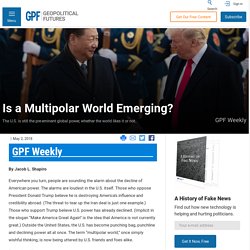
Shapiro. Is America Ready for a Multipolar World? “By 2025, the international system will be a global multipolar one.”

That is the forecast of the 2008 volume of the U.S. National Intelligence Council’s Global Trends series—a forecast that still seems correct today. Provocatively, that volume warned that “we cannot rule out a 19th century-like scenario of arms races, territorial expansion, and military rivalries.” At the time, many senior U.S. policymakers dismissed it and other, even earlier, warnings as just another worst-case “guesstimate,” the kind intelligence analysts love to produce. Where the intelligence community can be faulted is in thinking that multipolarity wouldn’t happen as quickly as it did. Hearing many presidential candidates today, it is as if we never left the unipolar moment.
Other great powers—China and Russia, particularly—don’t necessarily share American values, nor do they credit the United States with running a liberal international order. China's Rise to Global Economic Superpower. The International Monetary Fund (IMF), the most prestigious international financial institution in the world, has rated China’s ranking to number one economic superpower in the world — surpassing those of the United States based upon the purchasing power parity of GDP indicator (gross domestic product).
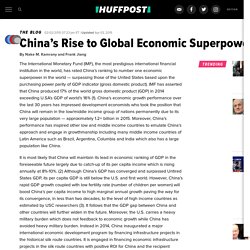
IMF has asserted that China produced 17% of the world gross domestic product (GDP) in 2014 exceeding U.SA’s GDP of world’s 16% (1). China’s economic growth performance over the last 30 years has impressed development economists who took the position that China will remain in the low/middle income group of nations permanently due to its very large population — approximately 1.2+ billion in 2015. Moreover, China’s performance has inspired other low and middle income countries to emulate China’s approach and engage in growthmanship including many middle income countries of Latin America such as Brazil, Argentina, Columbia and India which also has a large population like China.
A. China’s 2018 Military Budget: New Numbers, Old Worries. The One Important Ingredient for Regional Hegemony That China’s Still Missing. The Future: China's Rise, America's Decline. The U.S. can no longer boss China around.
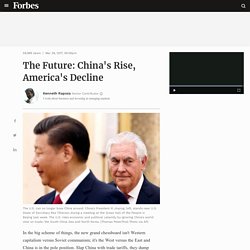
China's President Xi Jinping, left, stands near U.S. America Is Losing Global Influence. The time is ripe.
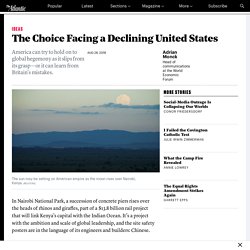
Its 45th president swung to power on the backs of voters worn out by the burden of expensive wars, tired of wartime austerity, and fed up with rising inequality. America has spent nearly $6 trillion on sustaining long-running conflicts in Afghanistan and Iraq. Median wages haven’t gone up in decades. Its health-care inequality is a byword in failure, infant mortality barely better than that of developing countries, and some states’ death rates are soaring because of “diseases of despair.” What Caused the United States’ Decline? EDITOR’S NOTE: This article originally appeared at TomDispatch.com.

To stay on top of important articles like these, sign up to receive the latest updates from TomDispatch.com. Think of it as the all-American version of the human comedy: a great power that eternally knows what the world needs and offers copious advice with a tone deafness that would be humorous, if it weren’t so grim. If you look, you can find examples of this just about anywhere. Bloomberg - Are you a robot? A new world is dawning, and the US will no longer lead it. Leer en español.
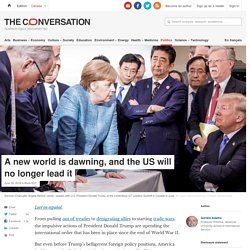
From pulling out of treaties to denigrating allies to starting trade wars, the impulsive actions of President Donald Trump are upending the international order that has been in place since the end of World War II. But even before Trump’s belligerent foreign policy positions, America had been gradually losing its dominant role in world affairs. A power shift among the nations of the world began at the end of the Cold War and has been accelerating this century. It is not as simple as saying “America is in decline,” since America remains a powerful country.
But American global power has been eroding for some time, as I argue in the Foreign Policy Association’s “Great Decisions 2018” volume. I am a foreign policy scholar and practitioner who has studied U.S. foreign policy through many administrations. Pax Americana no more American diplomacy has been essential to multinational agreements on trade, climate, regional security and arms control. Those days are gone. From a Unipolar to a Bipolar Superpower System: The Future of the Global Power Dynamic - Carnegie-Tsinghua Center - Carnegie Endowment for International Peace. The Age of Nonpolarity. The principal characteristic of twenty-first-century international relations is turning out to be nonpolarity: a world dominated not by one or two or even several states but rather by dozens of actors possessing and exercising various kinds of power.
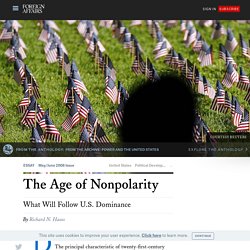
This represents a tectonic shift from the past. The twentieth century started out distinctly multipolar. But after almost 50 years, two world wars, and many smaller conflicts, a bipolar system emerged. The Rise of China and BRICs: A multipolar world in the making? By Dorothy-Grace Guerrero It is commonly said that the world is entering a multipolar phase in global governance with the “rise of the South” or the increasing powers of emerging economies China, India, Brazil, Russia and South Africa (from hereon the BRICS) and the strengthening of their relations as seen in the succeeding BRICS Summit since 2011.
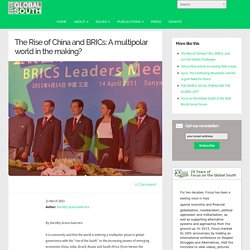
By the time this article sees publication, the BRICS Summit in Durban, South Africa would have added new achievements to further that notion. Many believe too that with the economic stagnation in the Eurozone and the US, BRICS countries are gaining more wealth, expertise, consumption power and the political clout to influence and re-arrange the global system to their advantage.